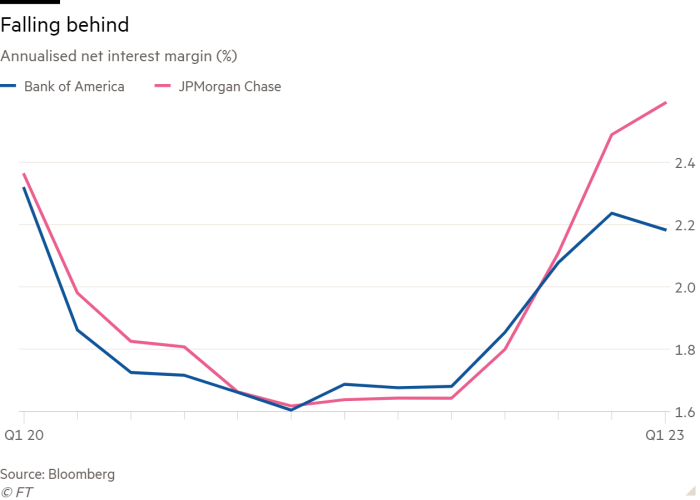[ad_1]
Receive free Global Economy updates
We’ll send you a myFT Daily Digest email rounding up the latest Global Economy news every morning.
Good morning. The US Supreme Court has curbed universities’ ability to consider race in admissions, a ruling that could have far-reaching consequences for diversity policies at employers across the country.
The decision by the Supreme Court in two of the most high-profile cases heard this term marks a blow for affirmative action in the US. The cases against the University of North Carolina, a public university, and Harvard University, the private Ivy League institution, were brought by Students for Fair Admissions, a non-profit organisation seeking to abolish racial considerations in admissions.
Students for Fair Admissions had argued the practice benefited black and Hispanic students to the detriment of Asian Americans and others. It asked the court to over-rule Grutter vs Bollinger, a 2003 Supreme Court decision that allowed universities to consider race in admissions by reaffirming that diversity is in the US government’s interest.
In the majority decision, the court’s six conservative justices held that affirmative action in the schools’ admissions programmes — which for decades have been a cornerstone of efforts to boost diversity in student bodies — violated the constitution’s equal protection clause.
Students “must be treated based on his or her experiences as an individual — not on the basis of race”, Chief Justice John Roberts wrote in the majority ruling.
Here’s what else I’m keeping tabs on today and over the weekend:
-
Economic data: Japan and Germany release unemployment rate figures, France publishes consumer price data and the UK releases final first-quarter GDP figures.
-
Sport: The 110th Tour de France cycling race begins on Saturday with a 182km medium-mountain stage beginning and ending in Bilbao, Spain.
-
Diplomacy: Emmanuel Macron begins a three-day state visit to Germany on Sunday, the first such trip by a French president in 23 years.
Five more top stories
1. Top Russian army general Sergei Surovikin has been detained amid Vladimir Putin’s crackdown on Wagner sympathisers following the militia’s failed mutiny last week. It remains unclear whether Surovikin has been charged as a plotter in the uprising or simply detained for interrogation, and where he is being held. Read more about Putin’s clean-up operation at the top of the security services.
2. China has passed a new foreign relations law that deepens President Xi Jinping’s control over the country’s external relations and strengthens the government’s legal basis for “countermeasures” against western threats to national and economic security. However, the legislation could undermine Beijing’s efforts to attract overseas investment.
3. The suspected Chinese spy balloon that was shot down in the US earlier this year was using some American technology, according to a preliminary analysis by the FBI. The finding that the spy balloon was carrying some US surveillance technology was shared by the FBI with some US lawmakers in March.
4. The UK’s stubbornly high inflation has convinced senior policymakers at the European Central Bank to maintain their aggressive stance on raising interest rates to avoid being accused of failing to contain price pressures. “We have seen what happened in the UK and we don’t want the same thing to happen to us,” a eurozone rate-setter told the FT. Read the full story.
5. Google said it would shut down its Google News service in Canada and block links to news in its search engine in the country, following passage of a law that would force it to pay Canadian publishers for links to news. Read more about the showdown between Canada and Google over paying publishers.
How well did you keep up with the news this week? Take our quiz.
The Big Read

Over the past quarter of a century, Chinese carmakers such as BYD, Nio and Great Wall have become experts in electric vehicles and battery technology. With their home market largely conquered, the companies have set their sights on Europe, where sales of new cars with petrol and diesel engines will be banned by 2035.
We’re also reading . . .
-
China’s military: Whatever Yevgeny Prigozhin was plotting in Russia last week — mutiny, insurrection, civil war — would never have been possible in China, writes Charles Parton.
-
Trump comedy: Whether we find his humour amusing or offensive, Donald Trump’s good comedic timing makes him a big electoral threat, writes Jemima Kelly.
-
Climate change: For many well-off people, the first tangible effect of rising temperatures will be a shift in vacation destination.
Chart of the day

Bank of America’s decision early in the Covid-19 pandemic to bet big on the bond market is now weighing on the bank’s net interest margin, an important gauge of performance that measures how much profit a bank makes on its loans and investments. For years, JPMorgan and BofA were neck and neck on this yardstick. But in the past year, JPMorgan has pulled ahead.
Take a break from the news
After she fled to South Korea, Kim Joo Kyung couldn’t stop thinking about her first love. So she decided to try to find him. Read this gripping story of two North Korean defectors in FT Magazine.

Additional contributions by Grace Ramos and Gordon Smith
[ad_2]
Source link

